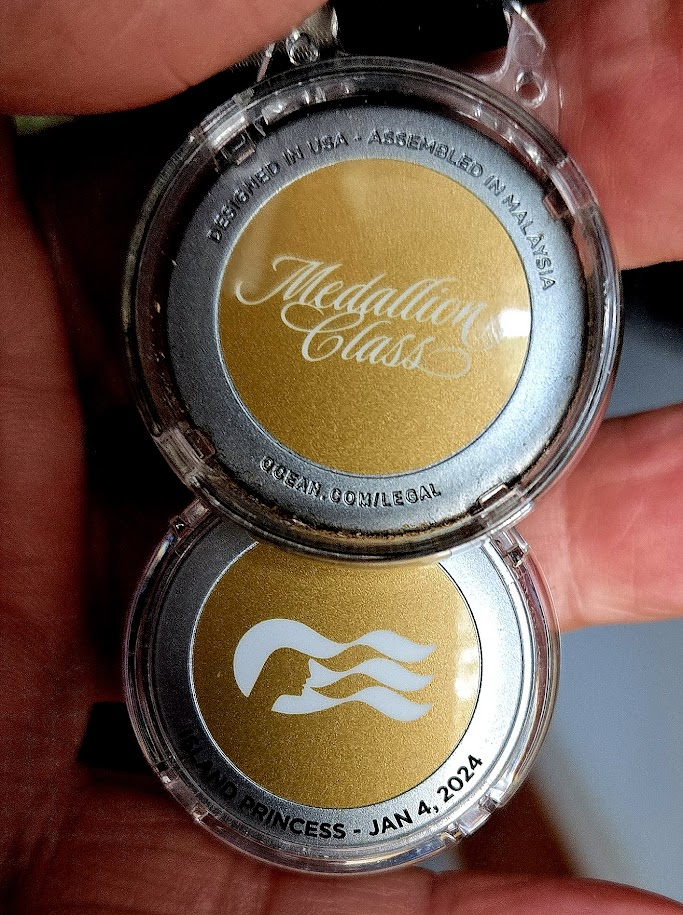 |
| Our Coast Guard companion with Cuba in the background |
The sun hadn’t yet cracked the horizon when I walked out on deck the first morning at sea. I can not sleep late while on a cruise ship, do not ask me why because I don’t know. I usually wake up well before sunrise and I have been doing it on each and every cruise I’ve been on except one, when drinking heavily may have been involved. I’ve learned to lay out my shoes and clothes before bedtime so I can dress silently, grab my camera, and slip quietly out of the cabin without waking my wife. I have seen some remarkable sunrises and an occasional thunder storm or two, and sometimes just other early risers to chat with, but it is always worth it.
The twilight hour just before sunrise is one of my favorite times of the day. Well, when I’m on vacation, at any rate. The weather on our first full day at sea was warm, a nice change from the December weather in Georgia, which everybody tells me is mild. Being a relocated Florida boy I’ll just take their word for it. I look around to see a few other early risers milling about and the several people who are always jogging around the upper deck track that we now find on every cruise ship. There are a few photo takers against the rail and several people just walking and chatting. The weather is absolutely beautiful. Trundling along abeam of us, not too far away, is a U.S. Coast Guard cutter, silently picketing between us and the island of Cuba just behind it. She isn’t keeping up with us so we gradually pull ahead of her.
Today will be a sea day as we traverse the famed Windward passage between Cuba and Hispaniola on our way toward Cartagena, Colombia, our first port of call early tomorrow morning. The Windward passage connects the Atlantic Ocean with the Caribbean sea and is the straightest path from the Panama Canal to the eastern seaboard of the U.S. It’s almost 6,000 feet deep at the point where the seas always display how the passage got its name. Today turns out to be brisk and we get to see whitecaps again, but the ship is unfazed. Most passengers are blissfully unaware of the sea and enjoy a great first day of what we find out, is a three month long cruise around the world. We had no idea our short fifteen day leg was a part of a longer cruise. The Island Princess will be back to Ft Lauderdale sometime in late March.
We spend a day touring the decks, looking at art work – no, not the auction - and checking out the eateries. Of course we check again with the Customer Service desk. No word yet about the missing Kindle. We are beginning to accept the fact it has been permanently lost. The ship’s staff have been incredibly helpful and more than courteous, they have been very friendly. We decide to head to the main dining room for early dining after checking the shops and ship’s amenities and meet a friend from Florida who coincidentally happens to be on the world cruise. We form a group with her friends and the Maitre d’ arranges for us all to sit together at the biggest table in the dining room. My wife and I have our traditional bowls of French onion soup, and enjoy a really delicious dinner, a great omen for the dining ahead, and the great conversations about their upcoming three month adventure.
As we are eating and chatting, one of the officers from Customer Service approaches through the busy tables, a big smile on her face. She stops, and hands my wife her missing Kindle! The story of recovering the missing Kindle is worth a book of its own, but it is really inspiring to know how many people handled the forgotten tablet, from the hotel maid and the front desk staff, the shuttle bus personnel, the cruise port staff, the loading crew, and the ship’s customer service team, each doing the right thing to return the forgotten Kindle. A really great cruise became even better. We finish the evening with a show in the ship’s theater and then head to the cabin to charge our batteries for the day tomorrow in Cartagena.
Cartagena
I'm on deck as the predawn twilight slowly breaks to our right, looking for the best spot to catch images of the rising sun against the city that sprawls before our silently arriving behemoth. An odd feeling as I thought we were sailing south and expected the sunrise on my left, but we are actually sailing north after entering the Bahia de Cartagena. The city surprises me with its contrasts, with high-rise apartments and condominiums that rival Miami Beach on the left, while small, working fishing boats heading out on the other side exemplify the working port that extends out in front of the orange ball of fire rising behind the hills on the horizon.
Within an hour, we are docked and the gangplank is open. While the passengers who have scheduled on-shore tours rush down the gangplank as soon as the hatch opens toward the massive row of waiting, air conditioned tour buses, we go and have a relaxed breakfast. I count twenty five buses when we dock, but by the time we disembark the number is down to just a handful.
Cartagena has a really nice welcome garden at the end of the dock with exotic birds and flowers and is a great introduction to the city. After spending time feeding monkeys and trying to remember names of all the exotic plants, my wife and I decide to walk into the old town and just take it easy and see what we can see.
We always stay in safe areas when we walk in strange cities. The dangerous areas are well publicized on social media and the Internet. Most ports have well organized welcome and shopping areas at the pier. We like to adventure beyond the skillfully designed welcome centers, but we are no longer young and fleet of foot, so to speak. We make sure we look where we walk, figuratively and literally. Pedestrian infrastructure is notoriously below the US American Disabilities Act standards in most other countries, especially in the Caribbean islands. We have seen holes next to broken sidewalks in several popular port cities we have visited that a horse would fit into. Nevertheless, there is no better way to see a city than walking it, so after studying maps on and off for several hours, we start off toward old town, just a mile or so away.
Just outside the gate of the port welcome center, we run into another couple from the ship, Del and Cynthia, laden with back packs and water bottles who are far more prepared than we are to hoof it in the heat of the day. We join forces and end up an hour or so later walking over the Puenta Roman bridge into Old Town.
The walk through the suburb is more than interesting as we pass an above-ground cemetery ala Key West, a sure sign high water here is not unexpected.
A quick summary: Yes, we would like to come back. The people we met are friendly and several helped answer questions and give directions. We visited the Convention Center which was hosting a native arts and crafts fair at the suggestion of a gentleman we met at a bayside park.
After visiting the modern convention center and walking through town, the four of us caught a taxi back to the port. The taxi driver spoke perfect English, and it turned out was an off duty police officer. We had another great meal back on board ship, and enjoyed another really well done show by the ship’s entertainers although they did have one piano player do a one man show who was just plain awful.
Other than that, it has been a great use so far and we can’t wait until tomorrow when we traverse the Panama Canal.
































